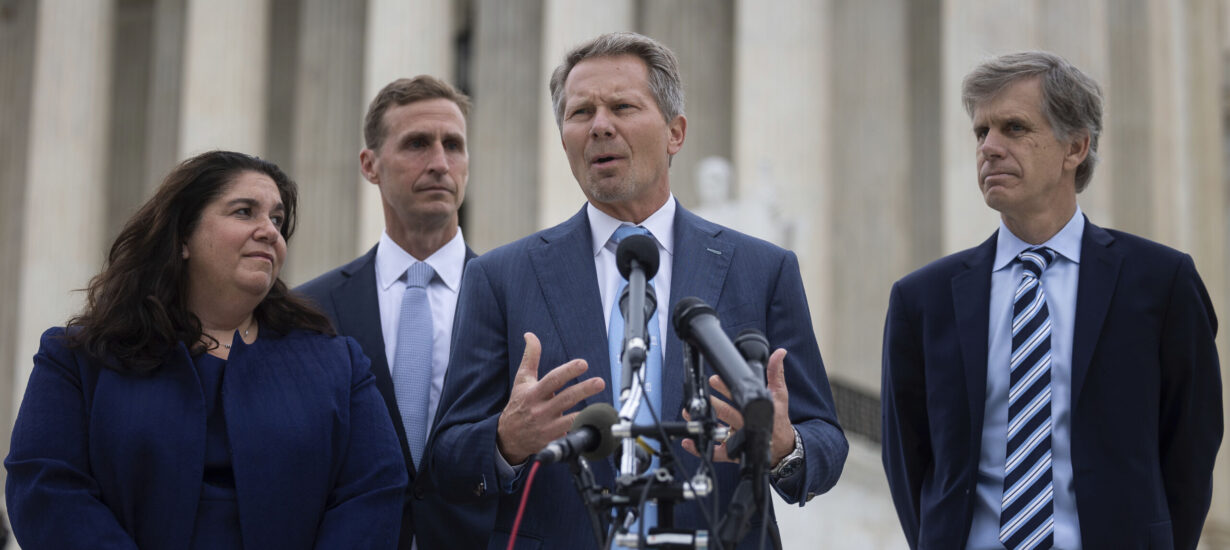Lawyers Representing UNC Argue Supreme Court Case

Lawyers representing Carolina and Harvard spent hours on Monday facing skeptical questions from the U.S. Supreme Court, which seems poised to rethink — and make dramatic changes to — the role of race in American college admissions.
In two linked cases brought in 2014 by the advocacy group Students for Fair Admission, the court is revisiting decades-old precedents that allow universities to consider race in a limited way when making admissions decisions.
“Racial classifications are wrong,” said Patrick Strawbridge, counsel for SFFA, in an opening statement that bluntly asked the court to overturn its position and ban affirmative action. The court’s 2003 decision to allow some consideration of race, Strawbridge said, is “grievously wrong. Its view that the educational benefits of diversity justify racial classification contradicts the Fourteenth Amendment’s guarantee of equal treatment.”
SFFA argued by making race even one of many factors in the admissions process, UNC and Harvard effectively discriminate against applicants who aren’t Black, Hispanic or Native American. There is particular harm to Asian American students, argued SFFA’s lawyers, suggesting Asian Americans are admitted at lower rates than their academic qualifications would justify. “The record in both cases is that racial preferences operate to the disadvantage of Asian American applicants,” Strawbridge said.
Carolina’s advocates rejected that charge, pointing out that just 1.2 percent of admissions decisions are influenced by an applicant’s race.
The Supreme Court’s decision will hinge on whether the justices think the educational benefits of a racially diverse student body are compelling enough to justify even a marginally race-conscious admissions policy and whether UNC and Harvard have shown that race-blind alternatives alone can’t create meaningful diversity on campus. On both counts, a majority of justices seemed impatient with the answers they got from lawyers representing the state of North Carolina, the U.S. Department of Justice and the Lawyers’ Committee for Civil Rights Under Law.
Justice Clarence Thomas, an outspoken opponent of race-based college admissions, repeatedly asked for a clear definition of diversity and an explanation of how it improves academic performance. “I’m really interested in a simple thing,” Thomas said. “What benefits academically are there to … the diversity that you’re asserting specifically? You’ve got studies that show that people feel better and they don’t feel isolated, on and on. I’m focusing on what you went to college to do, to learn something.”
David Hinojosa, representing the student respondents in the case, argued that diversity fosters innovation, reduces stereotypes and better prepares students to participate in a multiethnic society. The University could not achieve those benefits if race-blind admissions became the law of the land, Hinojosa contended.
That argument has not held sway with the general public. Polls consistently show majorities of Americans — including a majority of Black and Hispanic respondents and a majority of self-identified Democrats — say race should not be a factor in college admissions.
Everywhere affirmative action has been put to a statewide ballot, including twice in California, it has been rejected by voters. Higher education’s contention that the “educational benefits of diversity” are important enough to outweigh equal protection concerns has been persuasive to earlier Supreme Court majorities, but seemed much less so on Monday.
Justice Neil Gorsuch suggested if universities are truly committed to the ideals of an integrated student body, they could achieve greater diversity by eliminating preferences for legacies, the children of prominent donors or students who participate in unconventional sports such as squash.
“Suppose a university, a wealthy university, could eliminate those preferences which tend to favor the children of wealthy white parents and achieve diversity without race-consciousness, would strict scrutiny require it to do so?” Gorsuch asked.
Ryan Park, representing UNC as North Carolina’s Solicitor General, said it would, but eliminating other preferences still wouldn’t create the kind of student body UNC is seeking. “This learning environment helps us seek truth, builds bridges across students of different backgrounds, and, critically here, equips students with the tools needed to function effectively as citizens and leaders in our complex and increasingly diverse society,” he said.
Chancellor Kevin Guskiewicz, speaking on the steps of the Supreme Court after attending Monday’s oral arguments, also invoked the role of the University in preparing students for citizenship. “Today was about the value of diversity, a fundamental value that is core to our mission at Carolina,” he said. “This is about bringing and building a class every year of students at Carolina that will go on to become the civic leaders that we are going to count on to protect that democracy that has been threatened at times.”
The Supreme Court is likely to issue a decision next spring or summer.
Students for Fair Admissions Inc. sued the University in 2014 alleging racial discrimination under both the 14th Amendment and Title VI of the 1964 Civil Rights Act. SFFA also sued Harvard University, alleging intentional discrimination against Asian applicants.
At issue are long-standing Supreme Court decisions, affirmed as recently as 2016, that allow universities to consider race as one factor in admissions. SFFA is challenging Carolina’s admissions process, which follows the precedent set by the nation’s highest court. Federal, district and appeals courts have also sided with Harvard on the issue.
In July, University officials filed a response brief with the Supreme Court as part of the lawsuit challenging how universities select and educate students, arguing SFFA lacked standing when it filed its lawsuit, didn’t have a “requisite stake in the outcome” when the suit was filed and wasn’t a “genuine membership organization” when it sued UNC. The University also said it follows a holistic process that considers all aspects of an applicant’s background, and “race only rarely plays a meaningful role — explaining a mere 1.2% of admissions decisions. But as the district court found, even this limited consideration of race remains necessary to achieve UNC’s academic mission.”
— Eric Johnson ’08
